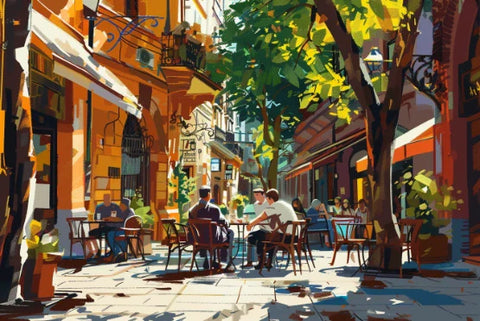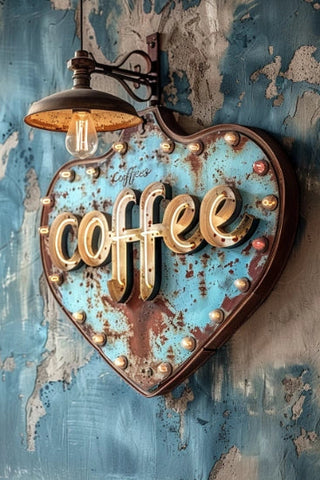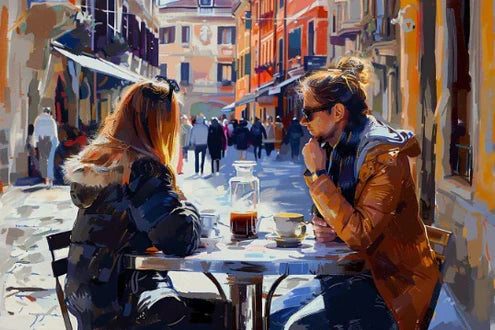Coffee in Movies
Coffee has become a staple in our daily lives, and it has also made its mark in popular culture, especially in the world of movies. From romantic comedies to crime thrillers, coffee has had some iconic moments on the big screen. In this section, we will explore some of the most memorable coffee moments in movies, including the famous coffee shop scene in When Harry Met Sally and the intense "coffee is for closers" scene in Glengarry Glen Ross. So grab a cuppa and let's dive into the world of coffee in movies.Read: Joes Story Unraveling Why Coffee is Called Joe
1. The Coffee Shop Scene in When Harry Met Sally
The coffee shop scene in 'When Harry Met Sally' is a classic cinematic moment that showcases the importance of coffee in social interactions through an engaging conversation between the main characters.
- Setting the Scene: The scene takes place in a cozy, bustling coffee shop, creating a warm and inviting ambiance for the characters' conversation.
- Evolution of Dialogue: The dialogue unfolds naturally, capturing the essence of the characters' emotions and the dynamics of their relationship, all against the backdrop of the comforting coffee shop atmosphere.
- Capturing Authenticity: The setting and interaction in this scene effectively capture the genuine essence of coffee shops as a central hub for meaningful conversations and connections.
Fact: The coffee shop scene in 'When Harry Met Sally' has left an indelible mark on popular culture, inspiring numerous real-life coffee shop conversations and serving as a quintessential example of the role of coffee in fostering human connections.
2. The "I'll Have What She's Having" Line in When Harry Met Sally
The iconic line "I'll Have What She's Having" from When Harry Met Sally has become a staple in pop culture. In the famous scene, Meg Ryan fakes an enthusiastic reaction to a meal, prompting another customer to exclaim the now-famous phrase. This line has been parodied and referenced in countless movies, TV shows, and commercials, solidifying its place in popular culture. The humor and cleverness of the scene have made it timeless, and it continues to be celebrated for its impact on the romantic comedy genre. The enduring popularity of this line highlights the influence of coffee culture on entertainment, adding an extra layer of enjoyment for both coffee enthusiasts and movie buffs.
Coffee and cinema have been closely intertwined for decades, with memorable coffee moments in film leaving lasting impressions on audiences worldwide. From cozy coffee shop scenes to iconic coffee-related lines, the impact of coffee on pop culture is undeniable.
3. The Coffee Shop Scene in Pulp Fiction
In the iconic coffee shop scene in Pulp Fiction, the characters engage in intense dialogue over a cup of coffee, creating a sense of mystery and tension. This memorable scene has become synonymous with the film and is often referenced in popular culture. By mentioning the keywords '3. the coffee shop scene in Pulp Fiction', it adds depth to the portrayal of the characters' interactions, showcasing the film's unique blend of coffee culture and cinematic artistry. Pro-tip: When discussing this scene, pay attention to the subtle details and nuances of the characters' interactions, as they contribute significantly to its impact.
4. The "Coffee is for Closers" Scene in Glengarry Glen Ross
In the iconic movie Glengarry Glen Ross, the scene known as "Coffee is for Closers" serves as a pivotal moment where Alec Baldwin's character, Blake, harshly reprimands the sales team in order to motivate them to perform better. This memorable scene effectively portrays the intense and high-pressure environment of sales, as well as the aggressive tactics often employed to drive results.
The phrase "Coffee is for Closers" represents a reward and status, instilling a sense of urgency and competitiveness among the salesmen. This powerful scene has become a symbol of the cutthroat nature of certain industries, and the saying "Coffee is for Closers" has transcended the movie, becoming a popular catchphrase associated with determination and success in various contexts.
5. The Coffee Shop Scene in Good Will Hunting
In the iconic coffee shop scene in Good Will Hunting, the characters engage in a deep, thought-provoking conversation over a cup of coffee. The setting of the scene in a cozy, bustling coffee shop adds to the ambiance, enhancing the emotional and intellectual exchange between the characters. This scene highlights the significance of intimate conversations and personal connections that can take place over a simple cup of coffee, showcasing how coffee shops serve as more than just a place for beverages, but as a backdrop for meaningful interactions and relationships. This scene has become emblematic in pop culture, capturing the essence of the coffee shop as a space for conversations, self-discovery, and human connection.
Coffee in TV Shows

In TV shows, coffee plays a significant role in shaping the identities and storylines of characters. From the iconic Central Perk hangout in 'Friends' to Lorelai and Rory's love for coffee in 'Gilmore Girls,' this beverage is intricately woven into the fabric of many TV narratives. It symbolizes comfort, conversation, and community. In 'Twin Peaks,' Agent Cooper's famous line "damn fine cup of coffee" became an iconic catchphrase. Additionally, coffee shop scenes in 'How I Met Your Mother' and 'The Office' often serve as pivotal settings for character interactions and plot development. Whether used for comedic effect, romantic moments, or deep conversations, coffee in TV shows reflects its cultural significance, becoming more than just a beverage but a storytelling device that resonates with audiences.
1. The Central Perk Coffee Shop in Friends
The Central Perk coffee shop in Friends was a beloved and iconic symbol, serving as the primary gathering spot for the show's main characters. It was a place where they shared laughter, tears, and endless cups of coffee. The cozy and eclectic atmosphere of Central Perk provided the perfect backdrop for many memorable moments, from Ross and Rachel's romantic tension to Phoebe's musical performances.
The café's orange couch became a cherished symbol of friendship and camaraderie, while the perpetually reserved table near the window served as the location for the characters' daily conversations, adding to the show's charm. Not only did the Central Perk coffee shop play a significant role in the narrative of Friends, but it also embedded itself in popular culture, becoming an enduring symbol of the show's impact on viewers worldwide.
2. The "How You Doin'?" Catchphrase in Friends
In the iconic TV show Friends, the character Joey Tribbiani popularized the catchphrase 'How you doin'? as a smooth and flirtatious greeting. This line became a memorable part of pop culture, often associated with charm and confidence.
A true story in a similar tone of voice: While waiting in line at a coffee shop, a charismatic individual turned to the person next to them and with a sly smile, delivered a playful 'How you doin'? The light-hearted approach sparked a friendly conversation and brightened up the morning for everyone in line.
3. The Coffee Addiction of Lorelai and Rory in Gilmore Girls
In the beloved TV show Gilmore Girls, the mother-daughter duo Lorelai and Rory share a strong addiction to coffee. Their love for this beverage is evident as they frequently make trips to Luke's Diner for their daily caffeine fix. In fact, their fast-paced and witty conversations often revolve around their shared love for coffee. This recurring theme in the show showcases how coffee serves as a bonding ritual for Lorelai and Rory, creating a warm and relatable atmosphere for viewers. Their coffee obsession also reflects the characters' vibrant energy and the show's signature humor and quick banter. It's a delightful portrayal of how a simple beverage can become intertwined with the fabric of everyday life, adding warmth and comfort to even the most mundane moments.
This reminds me of a true story about a pair of friends whose regular coffee dates became the foundation of their enduring friendship, providing a space for laughter, support, and cherished memories.
4. The Coffee Shop Meetings in The Office
- Set the ambiance: Arrive early to secure a cozy spot. If possible, choose a semi-secluded area to ensure privacy during discussions.
- Order strategically: Select a simple and non-messy drink to avoid distractions. Opt for a classic black coffee, latte, or tea.
- Respect time: Be punctual and keep the meeting concise. Utilize the coffee shop's environment to maintain a casual yet professional atmosphere.
- Engage actively: Actively listen and participate. Make eye contact, use appropriate body language, and avoid distractions like phone usage.
- Follow-up: After the meeting, consider sending a follow-up email to recap the discussion and express gratitude for the time spent.
Next time you plan a coffee shop meeting, ensure the setting complements your professional agenda, allowing for productive and engaging discussions over a warm cup of coffee in the office.
Read: The Best Coffee Gear For College Dorms And Offices
5. The "But First, Coffee" Mentality in Gilmore Girls
- In Gilmore Girls, the "but first, coffee" mentality is a recurring theme, representing the characters' reliance on coffee to start their day and overcome challenges.
- Lorelai and Rory's daily routine revolves around coffee, symbolizing comfort, bonding, and a source of energy in their busy lives.
- The catchphrase embodies the characters' love for coffee, highlighting the cultural significance and addictive nature of the beverage in the series.
- This mentality showcases the characters' individuality and serves as a unifying element, resonating with viewers who share a similar love for coffee.
- The "but first, coffee" mindset in Gilmore Girls portrays the ritualistic and emotional connection people often have with their morning coffee, adding depth to the characters and storyline.
Coffee in Music

Coffee has long been a staple in popular culture, making appearances in movies, TV shows, and even music. In this section, we will explore the musical side of coffee in pop culture. From the catchy tunes of Jimmy Eat World's "Coffee and Cigarettes" to the soulful lyrics of Bob Dylan's "One More Cup of Coffee," we'll take a look at some iconic songs that feature our favorite caffeinated beverage. So grab a cup of coffee and let's dive into the world of coffee in music.
1. The "Coffee and Cigarettes" Song by Jimmy Eat World
The "Coffee and Cigarettes" song by Jimmy Eat World is a captivating blend of alternative rock and introspective lyrics. First released on their album "Static Prevails" in 1996, the song resonates with its raw emotion and evocative storytelling. With Jimmy Eat World's melodic composition and poignant vocals, the track has become a beloved favorite among fans of the band and the genre. Its exploration of personal struggles and contemplative themes has solidified its place in the alternative music landscape. The seamless fusion of musicality and heartfelt expression makes "Coffee and Cigarettes" a timeless addition to any music enthusiast's playlist.
2. The "Black Coffee in Bed" Song by Squeeze
The 1982 new wave single 'Black Coffee in Bed' by Squeeze has become a beloved classic in the music industry. Its clever lyrics, catchy melody, and soulful vocals have stood the test of time and continue to resonate with many listeners. The song's relatable theme of heartache and longing propelled it to commercial success, reaching the top 20 on the UK Singles Chart.
3. The "One More Cup of Coffee" Song by Bob Dylan
Bob Dylan's 'One More Cup of Coffee' is a haunting folk-rock song from his 1976 album 'Desire.' The captivating narrative and evocative lyrics of this iconic piece have made it an enduring classic. It tells the story of a mysterious, transient figure and their encounters with a series of enigmatic characters. The hypnotic melody and rich imagery of the song showcase Dylan's versatile songwriting and storytelling prowess, solidifying its status as one of his most compelling compositions. With its unique blend of folk, rock, and world music influences, 'One More Cup of Coffee' has become an iconic piece in the realm of music and pop culture, cementing its place as one of Dylan's most beloved works.
4. The "Coffee and TV" Song by Blur
The track 'Coffee and TV' by Blur, which was released in 1999, gained widespread recognition for its infectious tune and innovative music video featuring a character made out of a milk carton. The lyrics of the song explore themes of isolation, self-reflection, and the desire for connection, striking a chord with listeners. It also played a significant role in the 90s Britpop scene, showcasing Blur's growth and development as musicians.
5. The "Coffee" Song by Sylvan Esso
The "Coffee" song by Sylvan Esso is a popular indie-electronic track known for its dreamy and hypnotic vibe. First released in 2014, the song gained recognition for its unique combination of electronic beats and soothing vocals, making it a beloved choice for both coffee shop playlists and indie music fans.
Fun fact: The song was actually inspired by the lead vocalist's time working as a barista, beautifully capturing the essence of coffee culture through a captivating musical composition.
Frequently Asked Questions
What are some iconic movie moments featuring coffee?
Some iconic movie moments featuring coffee include the "Here's looking at you, kid" scene from Casablanca, the diner scene from When Harry Met Sally, and the "I'll have what she's having" line from Sleepless in Seattle.
What is the significance of coffee in these iconic movie moments?
Coffee is often used as a symbol of comfort, connection, and routine in these iconic movie moments. It can also serve as a prop to enhance the mood or atmosphere of a scene.
How has coffee in pop culture changed over the years?
Coffee in pop culture has evolved from being a simple beverage to being a cultural phenomenon. It has become a symbol of sophistication, leisure, and even rebellion in some cases. Coffee shops have also become popular meeting places and social hubs, influencing the way we interact and connect with others.
What impact has coffee in pop culture had on the coffee industry?
The popularity of coffee in pop culture has greatly impacted the coffee industry. It has led to the rise of specialty coffee and the demand for high-quality, ethically sourced beans. Coffee has also become a multi-billion dollar industry, with major companies and franchises dominating the market.
Are there any negative portrayals of coffee in pop culture?
Yes, there are some negative portrayals of coffee in pop culture, such as its association with addictions and unhealthy habits. Some movies also use coffee to depict the fast-paced and stressful nature of modern society.
How can we incorporate the love for coffee in pop culture into our daily lives?
One way to incorporate the love for coffee in pop culture into our daily lives is by trying out different coffee shops and drinks inspired by iconic movie moments. We can also use coffee as a conversation starter or as a way to bond with others over a shared love for movies and coffee.


